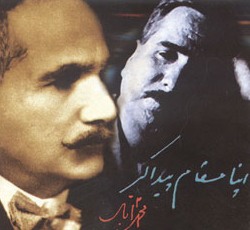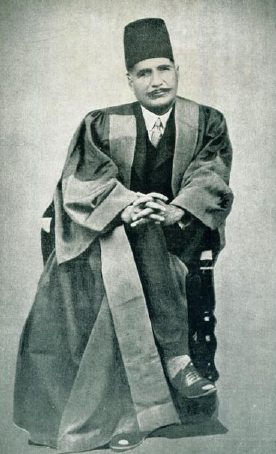Iqbal bhi Iqbal say aagah naheen hai
Mea culpa, Mea culpa, Mea culpa!
After a lapse of some fifty years I am re-visiting Iqbal’s Urdu poetry. It is a revisitation I would highly recommend we all do.
To begin with I was not English-medium but talaash–ai–maash turned me into one – I being part of the first generation of Pakistani brain-drainers. Confessedly again, I was brought up appreciating and enjoying Urdu and Persian prose and verse. English became the language of my thought and expression, as a consequence of my long working life as Diaspora.
Studying once again, today, the Urdu poetry of Iqbal is opening up entirely new vistas and new dimensions of understanding for me. What Iqbal wrote a hundred years ago has not changed, it is my understanding of him today compared to decades ago that has. This can happen to all of us in time. We all grow up, mature and find new meanings that may have eluded us earlier.
For this neglect I have no one else to blame but myself.
Zamaney kay andaaz badley gayey
Naya raag haiN, saaz badley fayey
There are, of course, many Iqbal’s that we have ourselves created and nurtured.
There is the official Iqbal that PTV, Radio Pakistan and the ‘officialdom’ projects and repeatedly broadcasts.
The official Iqbal is mostly Islamic, philosophical, at times a nationalist and is often projected as a pacifist. The official presentation of his poetry – very regularly recited and quoted on Radio Pakistan and PTV- is purposely obscured and often presented out of context. For example:
Koyee qabil ho tou humm shaan-i-kayee daitey hain
Dhoondney waloun ko dunya bhi nayee daitey hain
This Iqbal couplet from Jawab-i-Shikwa is often repeated these days by PTV. And nearly always out of context.
The scholars’ and the literati on Iqbal are no different from his ‘official’ proponents and make his work even more difficult to comprehend so that it is only understood by their own kind of elitism. Their discourses are mostly confined to his philosophy and scholarship peppered with some verses in support of their views. The popular, everyday Iqbal is ignored by them perhaps being too simplistic.
The two – officialdom and the literati – annually come together on the Iqbal day and other such occasions. They take pains to outsmart each other in making Iqbal more complex and thus hijacking him farther away from understanding by his common, everyday readers; all of us.
 Doosra (the other) Iqbal in addition to all of those attributes is simple to understand, straight forward, vibrant, of populace, often revolutionary, left-leaning, a lightening-rod and, when read in today’s time frame and context, even prophetic. This Iqbal shows that nationalism, self-reliance and confidence in ones self and, what can be achieved through these attributes are the materials that nations are built with.
Doosra (the other) Iqbal in addition to all of those attributes is simple to understand, straight forward, vibrant, of populace, often revolutionary, left-leaning, a lightening-rod and, when read in today’s time frame and context, even prophetic. This Iqbal shows that nationalism, self-reliance and confidence in ones self and, what can be achieved through these attributes are the materials that nations are built with.
His poetry is full of powerful messages to the youth, recognizing and extolling their boundless energies which he expects them to harness and channel. In his repeated references to the discovery of Self – Khudi – which can take one to reach heights considered unassailable. The message of Doosra Iqbal is simple, clear and straight forward, and directed mostly to the young:
Khirad Ko Ghulami Say Azaad Karr
Jawnoun Ko Piroun Ka Ustaad KarrJawanoun Ko Sozey Jigar Bakhshdey
Maira Ishq Mairi Nazar Bakhshdey
The issues and concepts he has dealt with close to a hundred years ago are representing themes and thoughts that are modern and contemporaneous. Iqbal’s poetry therefore, needs to be viewed and interpreted by younger and fresher eyes and in today’s context. This is the other Iqbal we need to revisit and regain sight of.
We must not fail to discover the other (Doosra) Iqbal that the official voices dare not reveal, broadcast nor acknowledge for fear of inciting the common man and thus portend their own demise. Viz.
Uthou mairi dunya kay ghariboun ko jaga do
Kaakhey umraa kay dar-o-deewar hilla doJis khait say dehqan ko muyyasar nahien roti
Uss khait kay har khosha ai gandum ko jala do
His compilation of poetry Zarbey Kaleem has a section of verses on Woman – Aurat – that touches on issues like purdah, women and education, women’s emancipation, protection of women and the like. The message though woven into poetry is modern to what we are dealing with in contemporary times.
Hazaar baar hakimoun nay iss ko suljhaya
Magar yeh masal-aey zan raha waheen ka waheen
At another place he deals with women’s emancipation issue in these words:
Kya cheez hai araish o qeemat main ziyadah
Aazadiey niswaan keh zammurad ka guluband?
There is much that we need to unearth in Iqbal still. Much that lies beyond what official and literati Iqbal has been made to symbolize. If today there is a search for identity, belonging and a direction, Iqbal can be at the fore-front of those who could fill that void. This post is part of a larger work in progress for which I have sought help and guidance from those much better versed in Iqbal and Urdu poetry. This piece should only be considered a teaser; one hopes that collectively we can begin a revisitation of Iqbal; a revisitation that will leave all of us more enriched.




















































Some comments from the ATP Facebook Page:
– “great”
– “Mujahideen Freedom Fighter Ghazi Hakimullah Mehsud likes Iqbal’s poetry.”
– “Iqbal was also the favorite poet of freedom fighter Bhagat Singh, a Marxist and atheist. A lot of people, not just Pakistanis and Muslims, find inspiration in his words. Although much of his work has a religious flavor, many of the themes are universal and can be appreciated by people of all backgrounds.”
– “mujahideen freedom fighter ghazi…. U HAVE GOT TO BE KIDDING ME!”
– “Iqbal was the greatest philosopher and thinker of 20th and 21st century in the whole world. His poetry especially in his later part of life is all about Islam. His poetry in Farsi is worth reading. books like israr e khudhi and ramoz e bekhadi are highly recommended for the youth. if u cant understand persian than watch iqbal ka pakistan”
– “I think its great that Pakistani’s from different walks of life read Iqbal. But lets also read what he read – which far from being limited to Islamic philosophy (Rumi and so forth).
German thought, perhaps, had a more powerful influence on him, read Nietzsche, Kant and Goethe, and create the conversation that Iqbal was engaged in.
(Take pride in his contributions, but philosophers are not meant to be spoken of as accomplishments of a nation, the are meant to be read, referenced and compared and analyzed: http://thefloatinglibrary.com/2009/05/04/why-i-am- a-destiny-nietzsche/ )”
very interesting post which was long due.. i had a chance to visit iqbal academy lahore and found some interesting books there. really wish we could have more information on iqbaliat online too. unfortunately libraries in pakistan are more about displaying books in locked shelves rather than actually being given to readers.
i think the iqbal we know is from his early works such as shikwa, jawab-shikwa. these poems are child’s works compared to his later mature works such as zarb-e-kalim and armaghaan-e-hijaz, which actually define the real iqbal.
the real iqbal as i understand is no philosopher; he is against philosophers and treat them as confused. he advises patras bukhari not to be influenced by western philophies. he prefers ishq not ilm, loves rumi not raazi.
he certainly speaks against capitalism and shows some signs of socialism. he seems to prefer karl marx over economists, the latter he criticizes for giving nothing more than useless equations (calling them ‘khatoot-e-khamdaar ki numaish’)
his views are not liberal at all. he speaks against democracy as a western conspiracy. (jamhoor kay iblees). he speaks against mullah, faqihah, farangis, wahabi arabs and even certain sufis of khanqaah (see poem punjab ki peer-zadoon say )
i am not expert but i firmly think that the only person whom he truly admires is true mujahid. he admires tariq-bin-ziyad, hazrat ali, hazrat khalid-bin-walid, fatima-bint-abdullah.
Iqbal, as i know, was a warrior poet of islam.
Like all great poets, Iqbal’s poetry has many layers. The more you peel it the more you discover.
The first time I read Iqbal was, at a very young age, in our schoolbook. It was a poem for children, Prinday ki Faryad: “Aata hai yaad mujh ko guzra hooa zamana”. The poem would make us cry for the caged bird that sings the poem. Catching and caging birds was quite a popular thing among young kids. I never caged a bird after reading that poem. That was Iqbal, the environmentalist.
The second time, it was in class 7, when a senior student recited a couplet: Deh khudaya yeh zameeN teri nahiN – Teray aaba ki nahiN, teri nahiN, meri nahiN. I was scandalized. I thought Iqbal was addressing God. But much later I realized that Deh khuda meant, the feudal lord. That was Iqbal the socialist.
Later, we discovered other facets of Iqbal:
The anti-Mulla Iqabal: Awaaz hai dono ki usi ek fizaa maiN — Mullah ki azaaN aur, mujahid ki azaaN aur.
The Anti-Madassa Iqbal: Galaa tau ghont diya ahl-e-madrassa net era – KahaN say aaye sadaa La-ilaha- illallah
You go on peeling him, and you would find a new layer.
Deeda-i-Beena: Good luck to you in your research on Iqbal.
I whole-heartedly agree with the need to engage with Iqbal’s poetry with fresh eyes and an open mind. He is always thought-provoking, often entirely different from his state-created image but also contradictory at times.
However, the overarching need is for more people, particularly the young, to connect with the great literature of their soil. What is needed is better mastery of fundamental language skills and a change in mindset that encourages independent thinking and personal engagement with first rate works of literature. Our society puts too much value in deference to authority and not enough in encouraging individuality which ironically is the salient message of Iqbal’s poetry. Only unlocking the latent personal potential of every individual can make them a “shaheen”.
@ Saadat: I agree. A Reconstruction of Religious Thought in Islam.” is a seminal work by Allama Iqbal (a dynamic thinker), that was light-years ahead of itself in many ways. Though it speaks for Islam, it can be read and applied to everyone’s life, it also captures the essence of our modern predicament and every day experiences.
I would also suggest to go to the site (www.messagefromtheeast.com) and support the work of two young American film makers, Sean Fahey and Jeremiah Hammerling. While seeking an answer that where are the moderate Muslims?, they have made a documentary “Message from the East”. It is informative and inspirational documentary movie.
Talking to Jeremiah (Director) he said …”hope God-willing that we have helped to make Pakistan and Muslims proud of their wonderful heritage and also created something to show the Western world a different more positive side.”